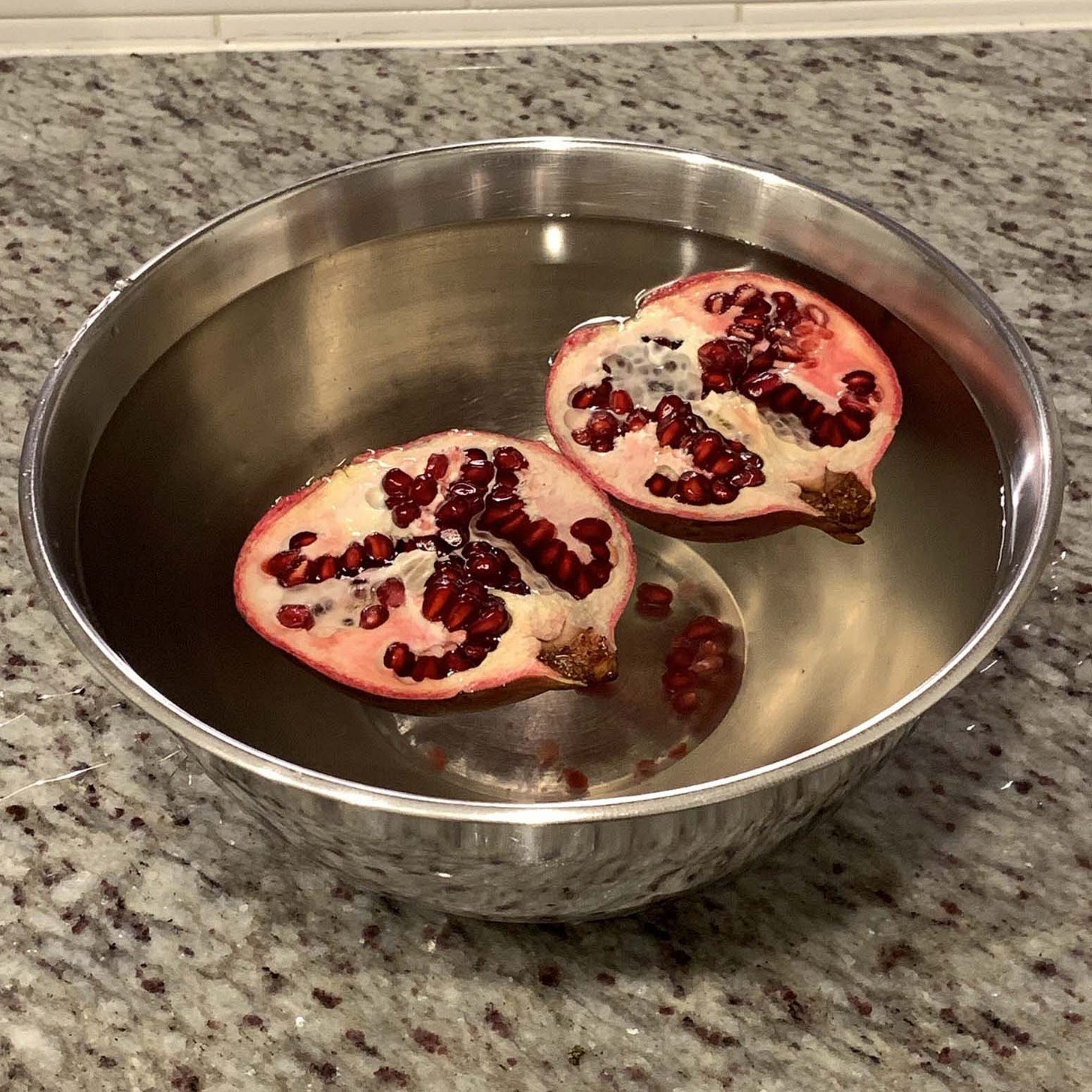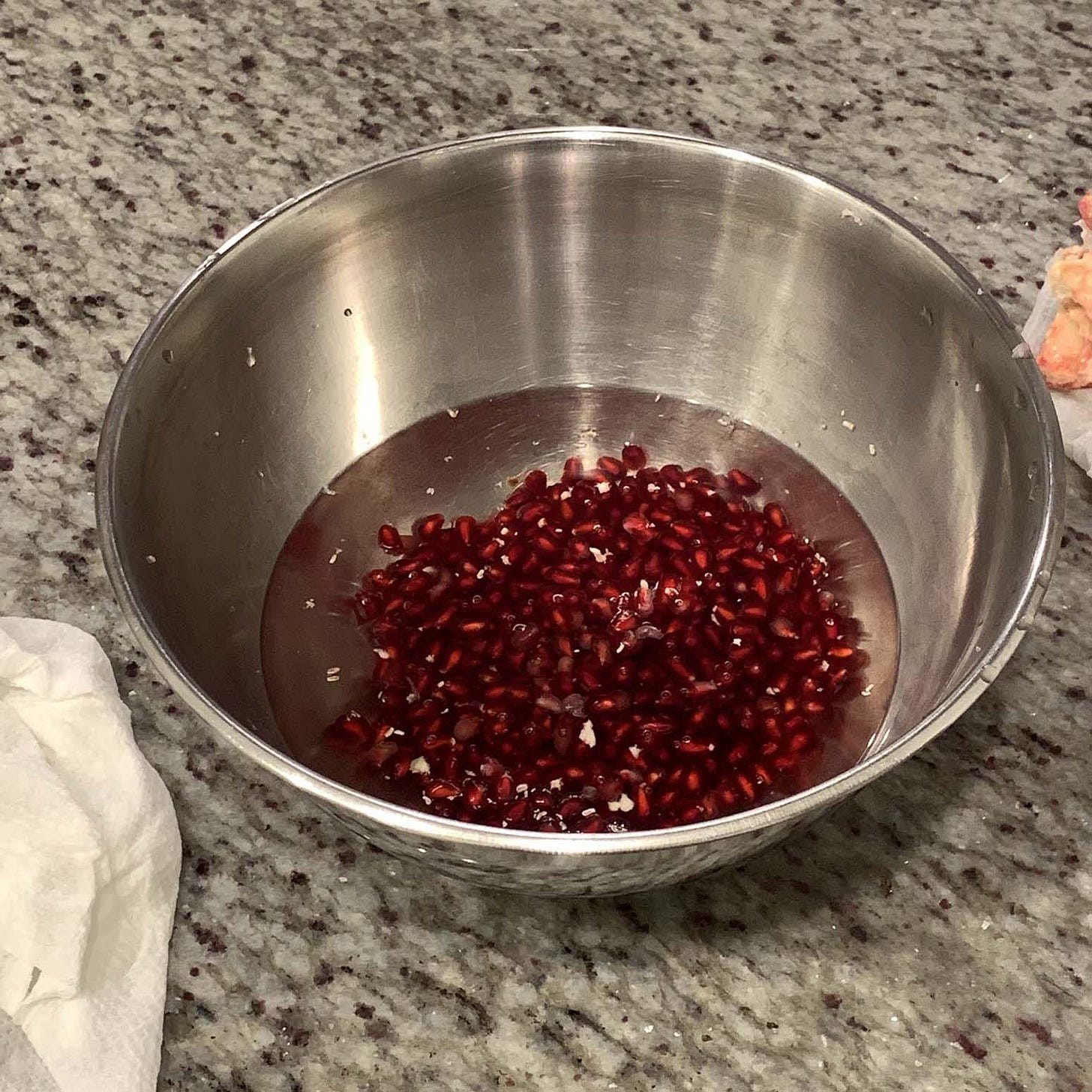Peel the Pomegranate!
THERE ARE TWO important facts or guidelines about how to peel and disassemble a pomegranate, and I have only been able to master one of them. I learned that one much later in life than I should have, from somewhere on the internet I no longer recall, and it is essential: you do it underwater.
If you peel a pomegranate in the open air, the way I learned to do it growing up, the filmy yellow-white inner skin and pith will cling to the arils, and with every move you make to break up the fruit and pick out the edible parts from the inedible ones, some of the arils will rupture and squirt little jets of dark red juice in all directions. Even if you love pomegranate, it's a messy and tedious chore.
When you submerge the pomegranate in a bowl of water, the breaking-up process almost takes care of itself. The arils obligingly plunge to the bottom of the bowl as they work free, the lighter membranes and bits of peel float to the top, and any wayward sprays of juice as you tease the former away from the latter dissipate harmlessly in the water. The only difficult part is picking out a large and deep enough bowl to fully submerge the pomegranate; the fruit doesn't look so big, but its diameter, translated into bowl depth, eats up a lot of volume. The process itself is almost magical.
How close to magical it is, though, depends on your ability to follow the other rule about peeling pomegranates: you have do it right away. If you put it off too many days, the fruit will start to get tired. Some of the arils, and then more of them, will develop brown parts and get flabby. The simple, joyous job of collecting the plump, gem-like arils will become the grim and finicky work of sorting out the still-firm, still-red ones from the squishy old ones, which when underwater transform from brown to a sort of jellyfish gray. Sometimes they still look red and healthy on top, and only reveal the gray when you roll them over.
Perversely, in the subconscious part of my mind that keeps track of how unpleasant various jobs are, this miserable, fussy sorting is what defines peeling a pomegranate—which means I don't want to do it, which means I put off doing it, which means that when I finally do do it, there are guaranteed to be mushy bits that will need to be sorted through. All of this could be avoided if I would simply peel the pomegranate as soon as I get it.
I am not much for self-help maxims, and perhaps not much for helping myself in general, but one explicit idea I try to make myself remember is this: Do your future self a favor. Jordan Peterson is a demented and wrong person about most things, but you really should make the bed right away, because you don't want to face an unmade bed later on. Hang up the laundry as soon as the machine stops, so you don't forget. Don't buy groceries on the weekend for something too tiring and complicated to cook on a weeknight. Peel the pomegranate!
But now it's pomegranate season and I keep letting myself down. I did it twice, even. The first one was OK after being neglected for nearly a week, with just a few fairly well-defined zones of mushy arils around the outer edge. I got away with it. Inspired by that non-failure, I got even lazier with the second one. I didn't go after it till the eve of the delivery of the third one, and it was a disaster. Not only were a third or a half of the arils bleary zombie gray, but when I broke open the last big chunk of the fruit in its ever-more tannic water bath, it exposed a matrix of actual mold—lumpy blue-green Roquefort-worthy mold—sprawling over even the firm-looking arils inside. I barely got anything to eat out of it.
No wonder this is the fruit that consigns a person to Hades. Chagrined, I dunked and peeled pomegranate No. 3 within hours of its arrival. There were still a score or two of mushy arils toward the outside, but they weren't my fault. Sometimes, that's the most help you can give yourself.








